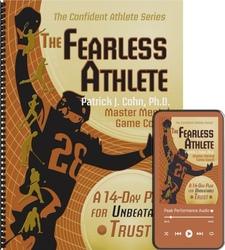
What legacy are you creating as an athlete?
Each athlete tells a story by how they act and respond to adversity. Each day, you add to your story, whether it’s consciously or unconsciously.
Sometimes, athletes forget that everyone hits rough patches. They feel they are the only ones who miss the last shot, strike out late in a game, give up a game-winning goal, are benched midseason, or get trapped in a performance rut.
No one’s career is a steady progression upward. Even the best athletes in the world must navigate injuries, slumps, mistakes, turnovers, errors, and bad games.
It is crucial to remember your legacy as an athlete is not what happens to you but how you respond to those events.
When you choose a positive mindset and respond optimistically to obstacles during your career, you craft a story you can be proud of when you are finished competing.
In addition, positive, purposeful action keeps you motivated and determined to accomplish your goals and uncover your athletic potential.
One common mental characteristic of athletes who build a positive legacy is resilience or mental toughness…
What is the characteristic?
Athletes with a mentally tough mindset understand that challenges are necessary to grow their game. Instead of seeing unfortunate breaks or bad games as unlucky or negative, they see these events as an opportunity to learn, bounce back, and become better and stronger.
Mentally tough athletes understand that one game doesn’t define a career and that legacies are built over time.
Expectations were sky-high when Caitlin Clark was drafted No.1 overall by the Indiana Fever in the 2024 WNBA draft…
Clark was the NCAA National Player of the Year award winner in 2023 and the NCAA Division 1 all-time leading scoring record-holder. With such high accomplishments and ability, it would seem that she would easily assimilate into the pro game and continue to ascend in the sport.
However, in Clark’s first game, despite scoring 20 points, she also was in foul trouble early in the game and committed ten turnovers, a record for a player’s first game in the WNBA.
It’s not Clark’s performance that is notable, but her response to her performance.
CLARK: “Just giving myself grace. It’s going to be a learning period for me, but at the same same time, still have the same confidence and belief in yourself that you’ve always had. That’s what’s got me to this point of just being myself, so continuing to be me, but also like, there’s gonna be things for me to learn and I’m gonna learn very fast.”
Clark’s legacy as an athlete is not merely her accomplishments but her work behind the scenes that helped her along the way.
The endless hours of training and honing her shot and ball handling skills, bouncing back after a bad game, dealing with distractions and outside noise, learning from her mistakes, and a refusal to back down are part of her journey.
When you consciously choose how to respond to adversity, you control the narrative of who you are as an athlete. How will you leave a positive legacy for athletes?
Think about what legacy you are leaving behind. Will you be remembered as a mentally tough athlete who persisted through tough times? Will you leave behind the legacy of never giving up?
To build a positive athletic legacy, decide the following:
- How do you respond after a loss?
- How do you prepare and practice?
- How do you react after a bad game?
- How do you handle performance slumps?
- How did you treat your teammates?
- How do you respond to adversity?
Related Sports Psychology Articles
- Are You A Fully Committed Athlete?
- Helping Young Golfers With Perfectionism
- Tennis Psychology Podcast: Coping with Mistakes

The Fearless Athlete (Digital Download)
“The Fearless Athlete” audio and workbook program helps you overcome fear and anxiety to perform with trust and confidence. Learn how to overcome the mental handcuffs of perfectionism and fear of failure, leading you to perform with unshakeable trust in your skills.
With the use of the ‘The Fearless Athlete’ and ‘Ultimate Sports Parent’ workbooks, I see subtle but significant results in a short period of time. My young athlete did not even know about positive self-talk until we started the program.”
~Adam, Sports Parent

